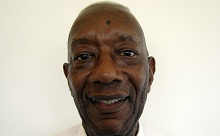

George Stewart is being honored as a Champion of Change for his work ensuring safety, dignity, and equality for the lesbian, gay, bisexual, and transgender (LGBT) community, as demonstrated by his inspiring video entry in the LGBT Pride Month Video Challenge.
I am so honored to be selected as a White House Champion of Change. This past year has been revelatory for me. In getting involved with Services & Advocacy for GLBT Elders (SAGE), I have been privileged to work with staff and other lesbian, gay, bisexual and transgender (LGBT) older people who are making the case that this population needs to be taken care of. I have found an increased desire to learn about politics and have become an advocate for LGBT older adults because I am an older adult. Advocating about the needs of LGBT elders and this overlooked population is so constructive, useful and needed.
Back in the 1980s I used to work in a hospital and I saw that other hospital aides, nurses—even doctors—treated the patients who were living with AIDS like they had the plague. Some of the aides and nurses would leave trays of food on the floors of AIDS patients’ rooms because they were afraid of contracting the disease. I thought to myself then, as I do now, that no one deserved to be treated like that. I think that’s when I first became aware of how discrimination touches everyone differently, and I it made me recall how I had experienced discrimination in the past.
When I was in the Army, from 1950-1953, I was stationed at one point in Louisiana. There was a park close to the base that I often visited to sit and read a book. One day, as I was sitting at the end of a long park bench, a white lady sat on the other end and we just each read our books silently. It was a beautiful day, I remember, and I was glad to be having some off-duty time. A park patrolman was walking down the path. Over the top of my book, I peeked at him and noticed how he looked at me, the park bench and the lady with disgust. He curled his upper lip, came towards me slowly and said that I wasn’t allowed to sit on that bench. I got up quietly—I’m not a fighter—and left. When my time came up in Louisiana, I opted to get out of the service and moved to New York City to experience life in the big city. I hoped my move would lead to better things—an opportunity to be a person in a larger city, instead of a black man sitting down next to a white woman.
Living in New York changed my life. I met new people, I went to parties, I was treated, mostly, as an equal. I never forgot that incident in Louisiana and when I saw how professionals treated AIDS patients, it just bubbled up again. It’s just not right to stand aside when discrimination happens, but people do it all the time.
Here, at SAGE, I’ve found people who care for LGBT seniors—who treat everyone with the respect and dignity they deserve. The gay community can be youth-oriented and doesn’t always recognize the fact that older people exist and need extra help—LGBT elders suffer from homophobia and ageism. SAGE has given me the opportunity to voice these concerns at New York City Council meetings, in Albany during Equality & Justice Day and to my local politicians. The sense of community, patriotism and responsibility that comes with being part of a movement is extraordinary and I’m so proud to be helping the cause.
When I volunteer, I meet people whose lives are made better by SAGE. I see people come in for events, groups and meals and they leave with smiles on their faces knowing they belong. That is why I became an advocate—people have to see that LGBT older adults can lead amazingly active lives, free of homophobia and stigmatism—if there is a place for them and people advocating on their behalf.
Some people ask me if I ever feel like slowing down—in addition to volunteering at SAGE, I sing in church choir and also attend a lot of the different social groups that SAGE has to offer. I tell them no! I’m proud of my age and I’m proud of the things I do for myself, my community and my friends—LGBT or otherwise. The opportunity to share these feelings as a Champion of Change is an honor and I can only thank SAGE for giving me the opportunity to do so.


